Where sex matters | Science
Science
Understanding and being able to speak clearly about the two sexes is perhaps most fundamental in science.

In humans, as in most animals or plants, an organism’s biological sex corresponds to one of two distinct types of reproductive anatomy that develop for the production of either small or large sex cells – sperm or eggs.
This differentiation evolved over a billion years ago. It is the reproductive strategy of all higher animals and plants, including the mammalian class to which humans belong. Understanding this is critical to biology and medicine.
Sex is determined at conception: the presence of a Y chromosome initiates not just hormonal cascades, but other developmental cascades which result in sex differences. Having two X chromosomes also has distinct effects on development. Sex differences exist at the chromosomal, genetic, hormonal, anatomical, physiological, and behavioural levels. Many of these differences are understood, and many remain to be studied.
What is the problem?
There is a dangerous and anti-scientific trend towards the denial of biological sex, even in science. Highly esteemed scientific periodicals are now running articles undermining the observable reality of biological sex. For example an article in Scientific American in 2018 argued “Biologists now think there is a larger spectrum than just binary female and male”. In 2018 an editorial in Nature stated “The research and medical community now sees sex as more complex than male and female.”
Arguments are made that because there are rare developmental conditions associated with anomalous chromosomal combinations or resulting in ambiguous sex characteristics, the categories male and female exist on a “spectrum,” or are simply “social constructs”. Such attempts to reframe sex as a social construct are harmful to scientific discourse and research, and to the ability to discuss the social implications of the reality of sex.
There are societal and legal questions about how best to accommodate people who do not feel comfortable with their sex, but addressing these do not require that we undermine scientific understanding or communication.
Updates
-
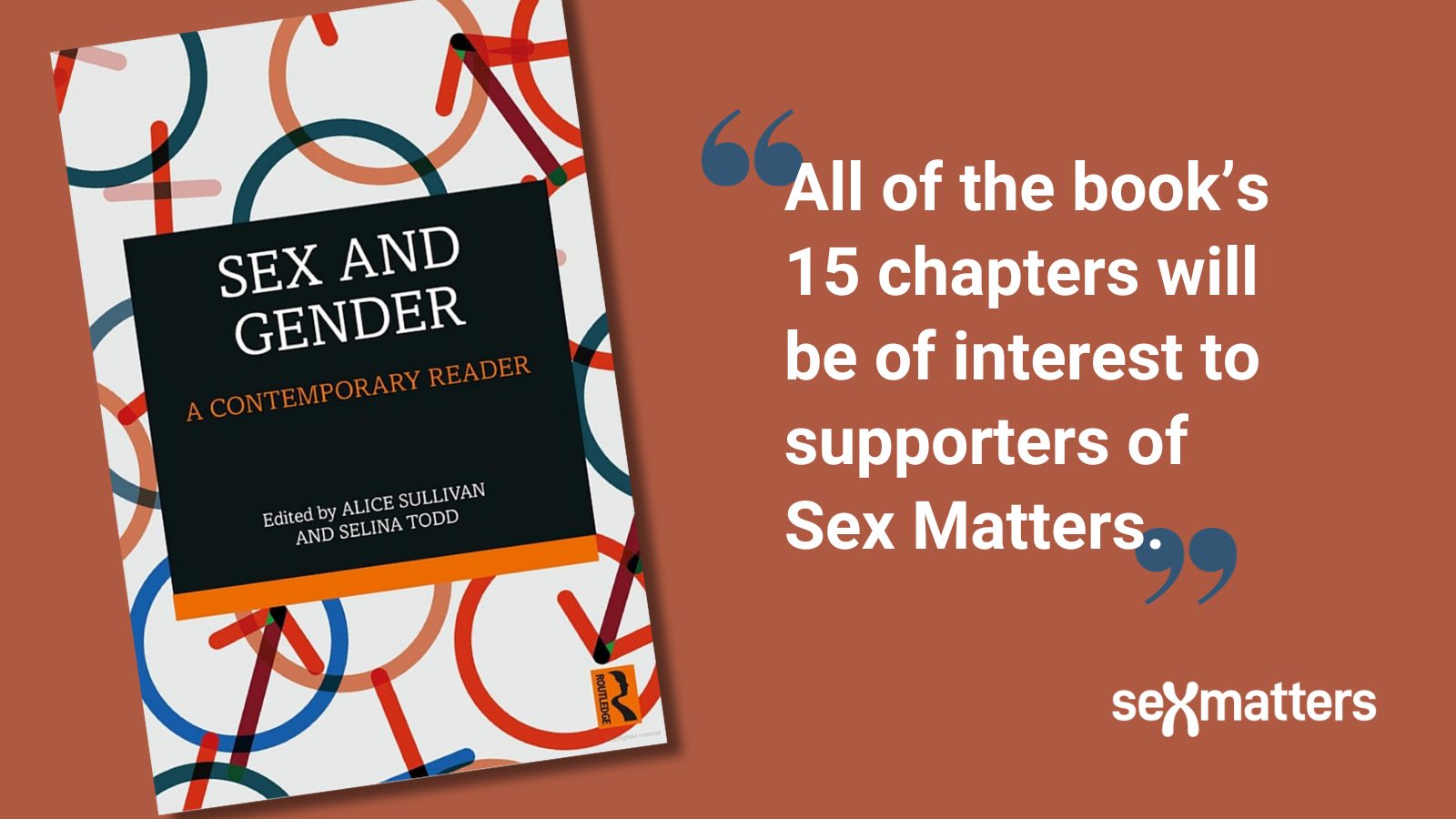
Sex and gender: a contemporary reader
Two directors of Sex Matters, Michael Biggs and Emma Hilton, have contributed chapters to Sex and Gender: A Contemporary Reader, an academic book just published by Routledge and edited by Alice Sullivan (who is in Sex Matters’ advisory group) and Selina Todd. Three further chapters are contributed by members...
18th September 2023
-
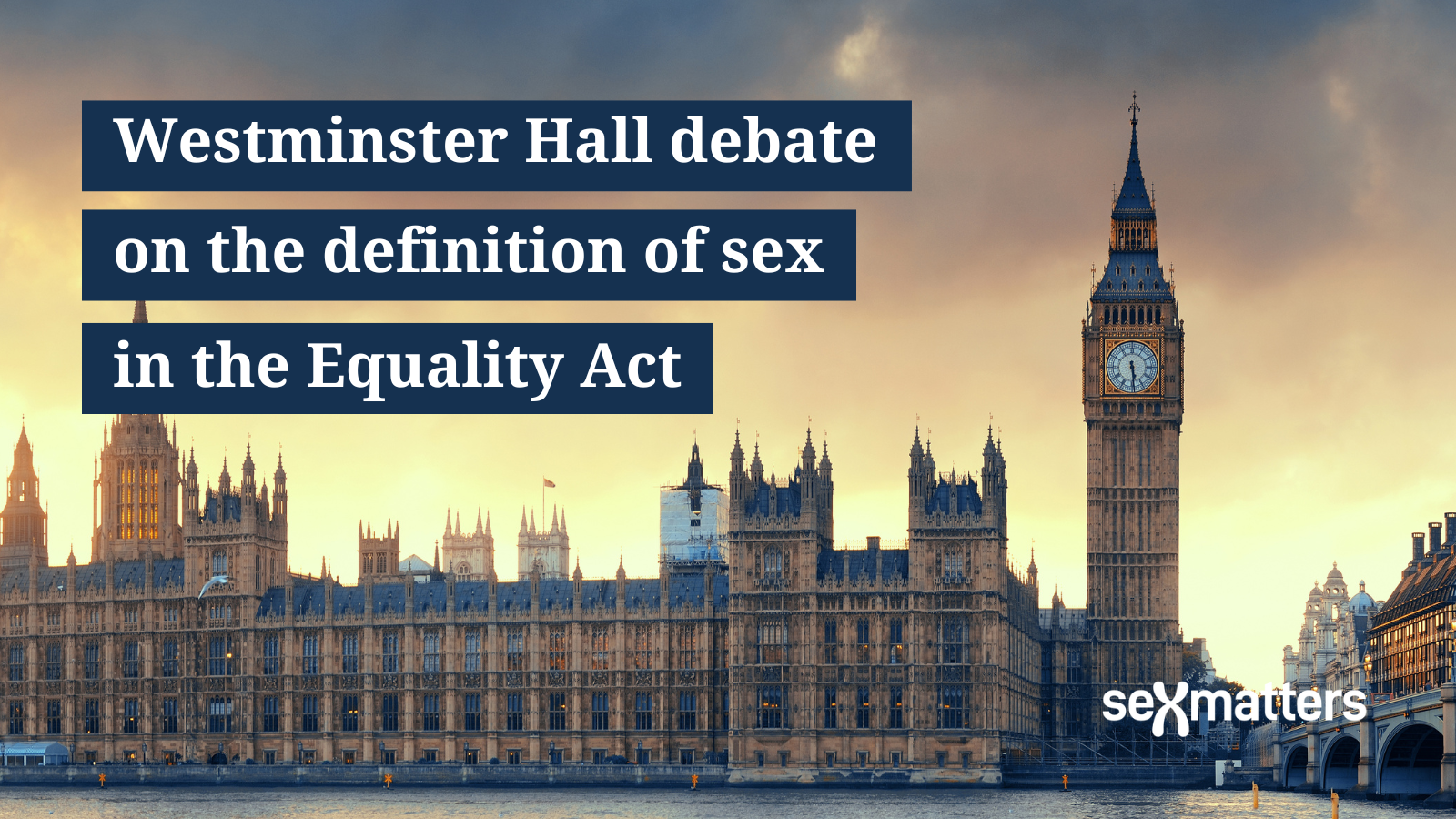
Westminster Hall debate on our petition to make the Equality Act clear
Monday 12th June 2023 For the full official transcription of the debate, see Hansard. In the Chair, Judith Cummins began by reminding everyone that the petitions being debated indirectly related to two ongoing legal cases in the Scottish courts, but that reference to those would be allowed. Tonia Antoniazzi (Gower)...
13th June 2023
-

Answers to questions on sex, gender, biology and identity
Sex Matters has written a set of frequently asked questions which seeks to provide answers in everyday language about the material reality of sex, and the idea of gender identity. The aim is to provide clear starting points for debate and discussion, for anyone trying to understand the competing...
28th April 2023
-
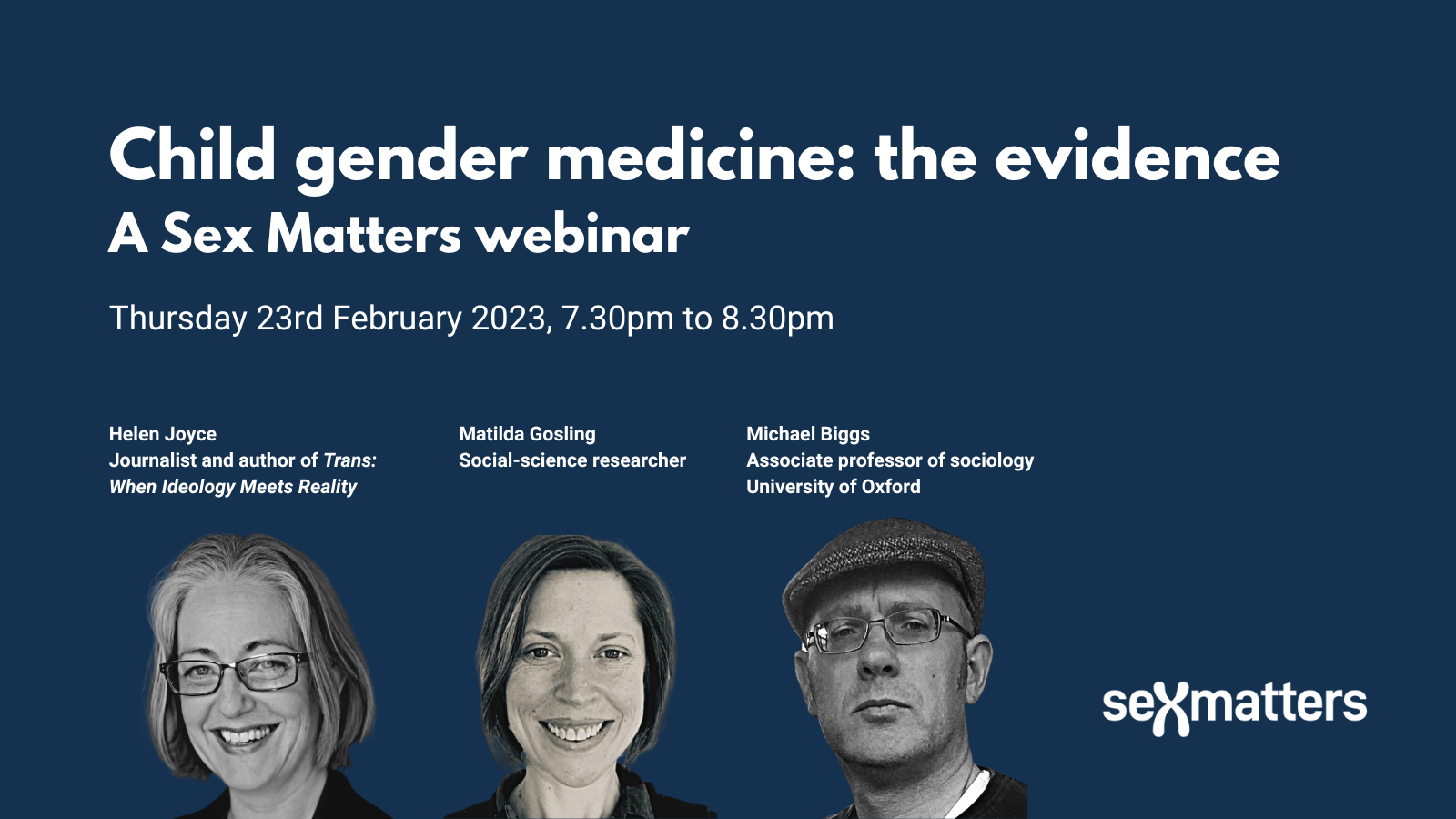
Child gender medicine: the evidence – webinar
At this Sex Matters webinar, on 23rd February 2023, our director of advocacy, Helen Joyce, talked with sociologist Michael Biggs and social-science researcher Matilda Gosling about current practice in child gender medicine, and the poor quality of the research it is based on. Watch the recording For other Sex...
14th February 2023
-

Clarify the Equality Act: sign the petition
The Equality Act 2010 protects everyone’s rights and covers everything from schools to hospitals, pubs to sports, and everybody’s workplace. It includes protection against sex-discrimination, and allows single-sex services. But on 13th December a judge in Scotland pronounced that Equality Act does not recognise biological sex as a protected...
16th December 2022
-

Sex and the law – share our short guide
What does intersex mean? Are you allowed to mention someone’s sex if they don’t want you to? Has someone with a gender recognition certificate changed their sex? Do you have the right to privacy when you’re taking your clothes off? Is it discrimination to keep male people out of...
4th August 2022
-
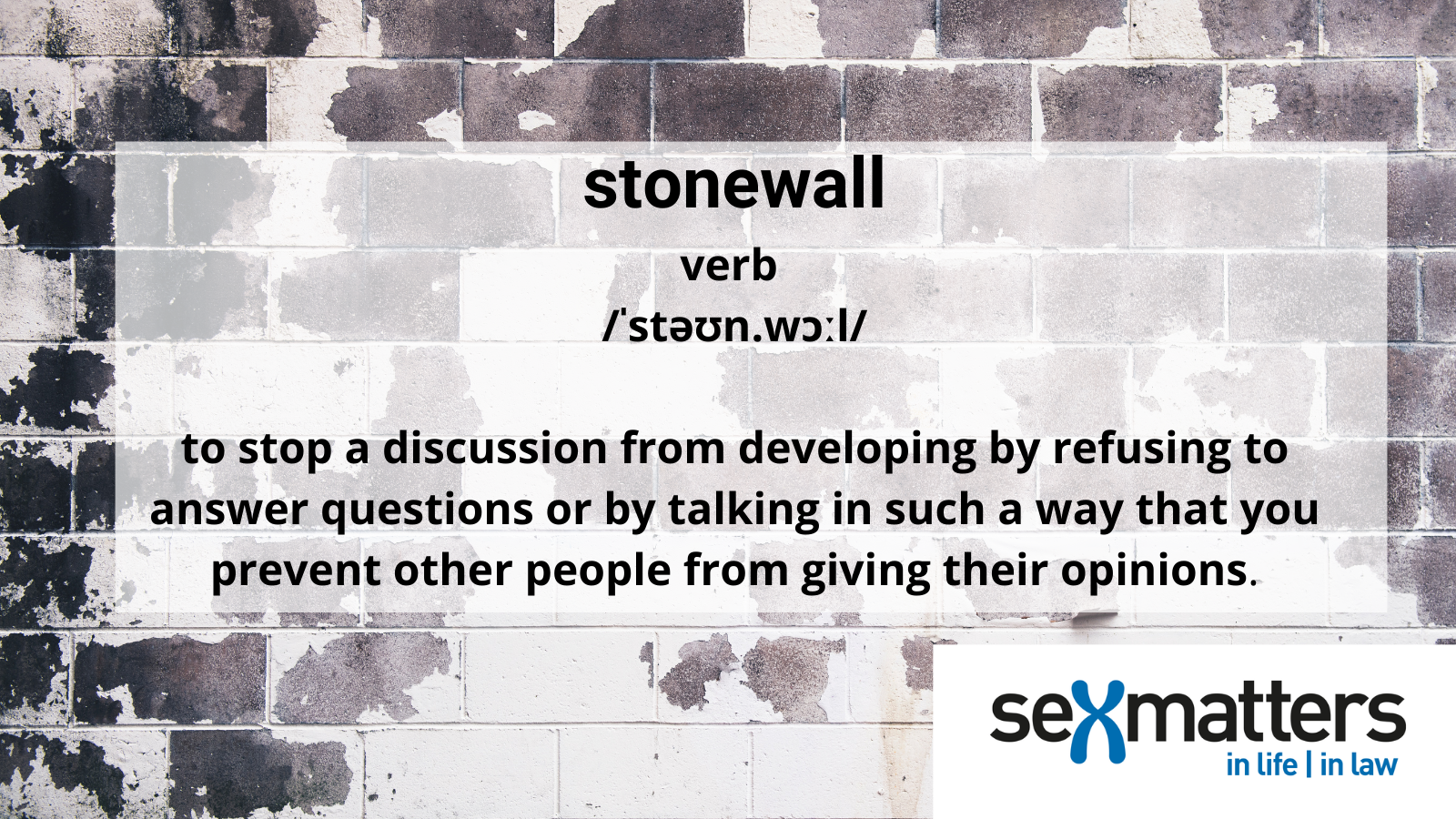
Truth and reconciliation
How should the public sector leave the Stonewall Champions Scheme?
6th June 2021
-

Time to #LeaveStonewall
This is the letter we have sent to the CEOs of the 850 organisations that are members of the Stonewall Diversity Champions Scheme. Re: Leaving the Stonewall Diversity Champions Scheme We are writing to call on you to withdraw from the scheme, both for the sake of your own...
29th May 2021
Other resources
-

SEEN in STEM
Formed in March 2024 for sex-realists in STEM who believe reality matters for continuing scientific and technological discoveries. For those who value truth, reason and material reality and recognise that the very foundation of how we make sense of the world, the scientific method, is being undermined. We cannot...
-
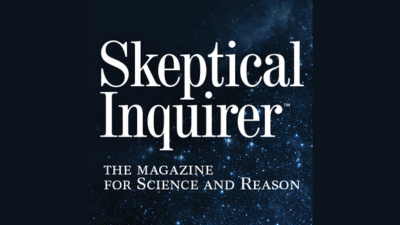
The Ideological Subversion of Biology
Jerry A. Coyne and Luana S. Maroja for the Skeptical Inquirer.
Biology is not dead, but ideology is poisoning it. The science that has brought us so much progress and understanding is endangered by political dogma strangling our essential tradition of open research and scientific communication. -

Should transwomen be allowed to compete in women’s sports?
A view from an Exercise Physiologist
Gregory A. Brown Ph.D., Professor of Exercise Science, Physical Activity and Wellness Laboratory, Department of Kinesiology and Sport Sciences, University of Nebraska Kearney,
Tommy Lundberg Ph.D., Assistant Senior Lecturer, Department of Laboratory Medicine, Division of Clinical Physiology, Karolinska Institutet, Stockholm, SWE -

EDI contra science – the misuse of “ethics” in academic research
John Armstrong writes for The Crtitic about how he was asked to survey elite athletes on their views on trans participation in athletics, but the ethics committee at King’s College, London rejected his research proposal on the grounds that the terms “male” and “female” were unacceptable.
1st April 2023
-

Biological sex is binary, even though there is a rainbow of sex roles
BioEssays volume 45, issue2 – February 2023
Authors Wolfgang Goymann, Henrik Brumm and Peter M. Kappeler explain why denying biological sex is anthropocentric and promotes species chauvinism. -

Race Is a Spectrum. Sex Is Pretty Damn Binary.
Richard Dawkins writing for Areo magazine after a heated discussion on Twitter.
-

Swedish cohort study on sex reassignment
Long-Term Follow-Up of Transsexual Persons Undergoing Sex Reassignment Surgery: Cohort Study in SwedenDhejne C, Lichtenstein P, Boman M, Johansson ALV, Långström N, et al. (2011) Long-Term Follow-Up of Transsexual Persons Undergoing Sex Reassignment Surgery: Cohort Study in Sweden. PLOS ONE 6(2): e16885.
-

The dangerous denial of sex
Biologists Colin M. Wright and Emma N. Hilton (2020) Wall Street Journal argue that there are two sexes, and that transgender ideology harms women, gays – and especially feminine boys and masculine girls.
Publications
-
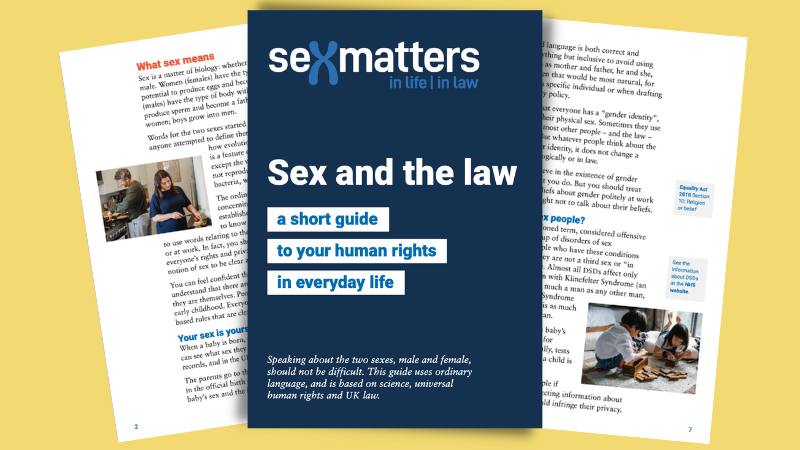
Sex and the law
A short guide to your human rights in everyday life.
Speaking about the two sexes, male and female, should not be difficult. This guide uses ordinary language, and is based on science, universal human rights and UK law -
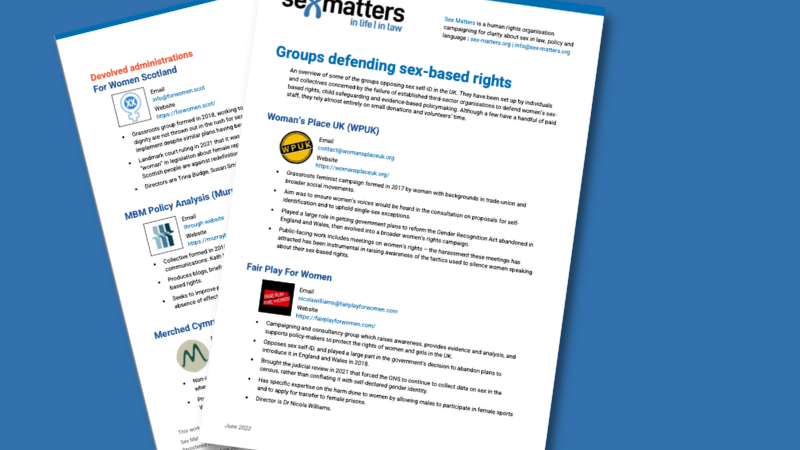
Groups defending sex-based rights
Overview of groups opposing sex self-ID in the UK, set up by individuals and collectives concerned by the failure of established third-sector organisations to defend women’s sex-based rights, child safeguarding and evidence-based policymaking. Also listed on our website.
-
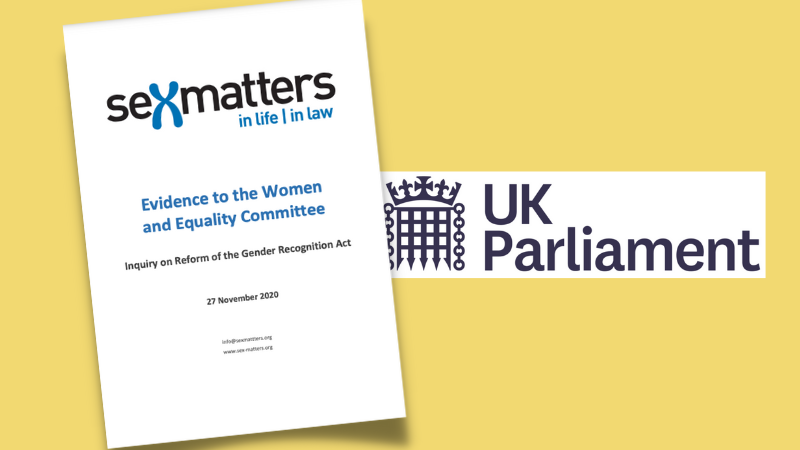
Gender Recognition Act reform – evidence submission
We answer the Women and Equalities Select Committee‘s questions and make six recommendations.

